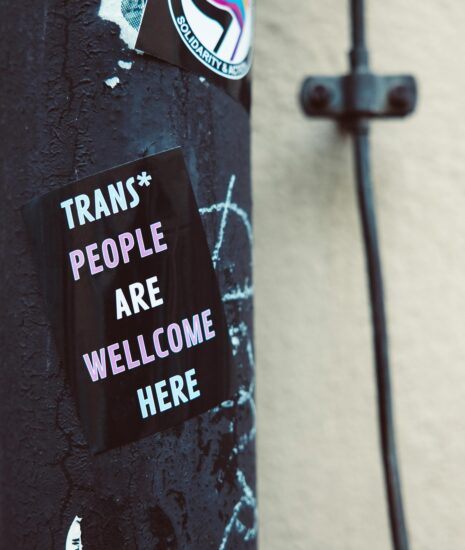When the Law Forgets Our Names
Trans Rights, Vicarious Trauma, and the Weight of Political Grief
The Toll of Anti-Trans Laws
There is a particular kind of ache that takes root when your existence is debated like a policy point. When the language of law reduces your life to a footnote or a battleground. For many trans people, the recent ruling in United States v. Skrmetti was not just a legal loss—it was a psychic blow. One that echoed far beyond the courtroom.
Even if you’ve never stepped into Tennessee. Even if you weren’t the plaintiff or the parent. Even if you simply woke up and saw the news, phone in hand and breath half-held—you might still have felt it: that deep, familiar drop. The sensation of being legislated into harm. Again.
This is the shape of vicarious trauma. And it is political. And it matters.

What Was United States v. Skrmetti?
At its core, Skrmetti was a challenge to Tennessee’s ban on gender-affirming care for transgender minors. It pitted the federal government’s civil rights enforcement against the state’s claim to legislate “health care” as it sees fit. The outcome upheld the ban, denying access to gender-affirming medical care for youth across Tennessee—and setting a dangerous precedent.
But the legal mechanics, while important, are not the whole story. For queer and trans people—especially those with lived experience of systemic harm—this decision is more than a verdict. It’s a message. A memory. A trigger. A continuation.

Vicarious Trauma in the Age of Anti-Trans Legislation
Vicarious trauma refers to the emotional residue left behind when we witness or hear about another’s suffering—especially when it mirrors our own. For trans people and our loved ones, rulings like Skrmetti function as mass-scale retraumatization. They send the nervous system into old spirals: fear, hypervigilance, grief, shutdown.
You may notice yourself:
- Avoiding the news but feeling dread anyway
- Experiencing somatic symptoms: headaches, gut issues, fatigue
- Losing words or feeling numb
- Disassociating during moments of safety
- Mourning things that haven’t happened—but could
This is not weakness. This is your body remembering. Reacting. Protecting.
And when the harm is political—when it comes cloaked in the language of governance and legitimacy—it can be even harder to name.
The Nature of Political Trauma
Political trauma is chronic. It’s what happens when your body, your family, your love, your rights are continuously threatened by institutions that claim to serve the people. It is experienced not just by those directly impacted by laws, but by everyone who is forced to live under them.
For trans people, especially those who are racialized, disabled, immigrants, or poor, political trauma isn’t an exception—it is the backdrop. And when the courts rule against our care, against our autonomy, it is not just the law that shifts. Our sense of safety contracts. Our world becomes smaller.
Political trauma is also intergenerational. Trans youth growing up today are inheriting not only resilience, but a long history of being pushed to the margins. A history we are still living.
“But It Didn’t Happen to Me…”
You don’t have to be the one in court to feel the cost.
One of the most harmful legacies of systemic trauma is the pressure to justify our pain. You might hear an inner voice say, “I’m not in Tennessee. I’m not a parent. I’m not even on hormones. Why does this hurt so much?”
Because you are connected. Because transness is kinship. Because solidarity is not metaphor—it’s nervous system, it’s cellular, it’s sacred.
We feel for one another. And in a time when the world feels increasingly hostile to our thriving, that is not a flaw—it’s a bond. A resistance.
Navigating Grief, Anger, and Numbness
There is no right way to feel in the aftermath of political harm. Some of us go quiet. Some of us rage. Some organize, while others hide. These are all valid. Trauma responses are adaptations, not moral failings.
What helps is having language, having space, and not having to pretend that you’re okay.
Consider these small, soft offerings:
- Take digital distance. Log off. Breathe in a space that doesn’t talk back.
- Name what’s real. Say aloud, “This hurts, and I’m scared.” Or “This feels familiar, and I don’t want it to.”
- Ground through the body. Cold water. Weighted blankets. Petting an animal. Movement.
- Connect with others who understand. Whether it’s in group chat, trans support circles, or chosen family. You don’t have to carry this alone.

A Soft Refusal
The ruling in Skrmetti will shape lives. But it will not define them.
Trans joy, trans survival, trans becoming—these are not dictated by the courts. They are practiced in kitchens and bedrooms and tattoo shops and book clubs and clinics and dance floors. They are cultivated in gardens, in rituals, in the quiet trust between two people who see each other whole.
We refuse despair not because we are naïve—but because we are practiced in it. We know the weight. And we choose, again and again, to reach for one another anyway.
A Future Still Ours
The law may forget us. But we remember each other.
In the wake of Skrmetti and every ruling like it, the question isn’t just how we fight back—it’s how we care for each other while we do.
How do we make room for our pain without letting it consume us?
How do we honor grief without letting it turn to stone?
How do we rest, not as retreat—but as resistance?
There is no one answer. Only this: the work of tending to each other is sacred. And it is enough.
Even now. Especially now.
